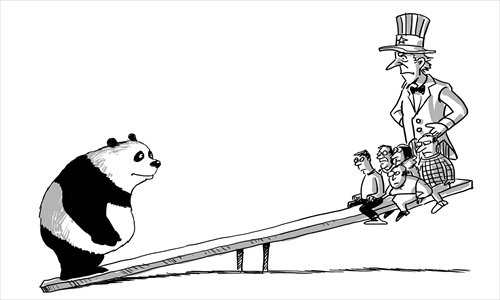HOME >> OP-ED
Pivot necessary to sustain long-term US interests
By Elizabeth Economy Source:Global Times Published: 2013-10-29 19:28:01

Illustration: Liu Rui/GT
In an ideal world, US President Barack Obama would have traveled to Asia for the recent APEC and ASEAN meetings, waved the American flag, and reassured the region once again of US commitment.
However, the world is a flawed place, and instead President Obama was stuck in Washington, DC to weigh in on the congressional wrangling over the budget and his healthcare plan.
Some analysts have posited that the president's absence signaled the death of the pivot, but such an assessment represents a fundamental misunderstanding of US policy.
The US pivot to the Asia-Pacific region is about three things. First, it is about US interests.
There is a recognition that the US has important and enduring interests in the region that demand greater attention.
The region is a dynamic force in the global economy, and the US wants to grow its trade and investment relationships there.
Second, regional security is also a US priority, especially maintaining the openness and security of the sea lanes through which nearly 50 percent of global trade, including one-fourth of US trade, flows.
Then there's the politics of the region. The Asia-Pacific is a region where nascent or not-quite democracies, such as Myanmar, Malaysia, and Cambodia, can benefit from US assistance in developing the rule of law, transparency, and other fundamentals of good governance.
This matters to the US for human rights reasons, as well as for these states' ability to contribute to global good governance on issues such as intellectual property rights protection and food and product safety.
Finally, the pivot is a response to US allies and partners in the region who want a stronger US presence in good measure to balance the uncertainty they feel over China's expanding security interests and activities. Geopolitics evolve; after all, the Philippines kicked the US military out of the base at Subic Bay in 1992, but two decades later is eager for its return.
China has changed its own security strategy from "near seas active defense" to "far seas operations," and is developing military capabilities to match its more expansive set of priorities.
Some 10 years from now, the interests and needs of the region are likely to look different yet again.
But for now, these countries want Washington to have a robust presence in the region, despite Beijing's complaints.
The pivot, at its heart, is about rules of the road and what those rules should look like for the better part of the 21st century.
While the pivot may be a uniquely US policy, Washington can neither make nor enforce the rules of this engagement on its own.
The Trans-Pacific Partnership, for example, is an enormously complicated and complex set of negotiations among a multitude of regional players.
No single player will determine the outcome, and the rules it establishes will benefit the region for years to come.
No other country has the capability of the US to secure the sea lanes. As other countries, such as China, India, and perhaps Japan develop their own naval capabilities, however, the role of the US will evolve; codified rules of engagement can ensure a continued commitment to free and open sea lanes.
And while the US cannot determine the form of government for any other country, it is in the interest of Asia as a whole to have not only stable but also well-governed regional governments.
As important as what the pivot is, is what it is not. It is not about the US and China, and which country is more important in Asia. Let's not forget, for example, that Japan is a far more significant source of investment in Southeast Asia than either China or the US.
The pivot is an American vision rooted in US interests in, and understandings of Asia, but nothing about it seeks to exclude China.
Let's resist, therefore, the easy, but ultimately highly destructive, tendency to view the pivot through the lens of US-China competition and focus on the opportunities, individual and shared, to contribute to a stable and prosperous Asia-Pacific region.
The author is C.V. Starr senior fellow and director for Asia Studies, Council on Foreign Relations. opinion@globaltimes.com.cn
Posted in: Viewpoint